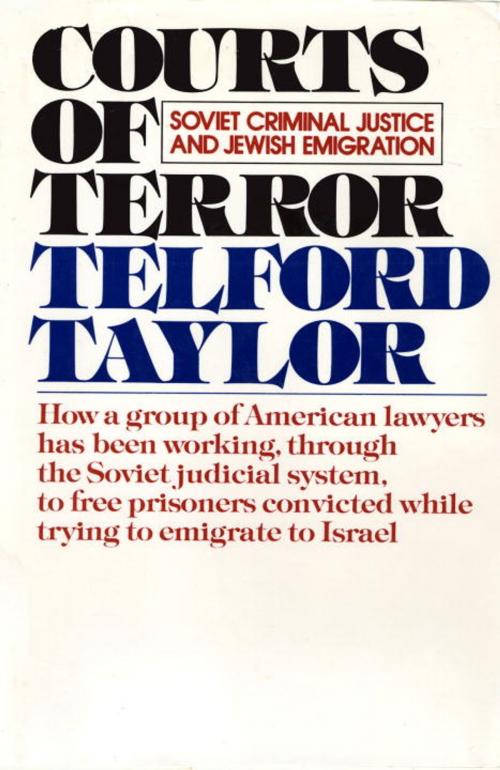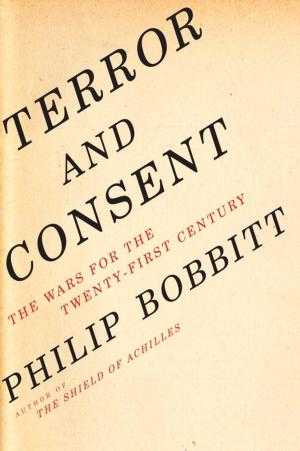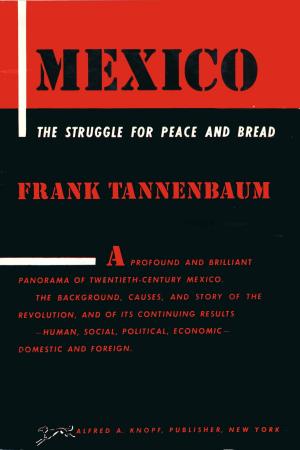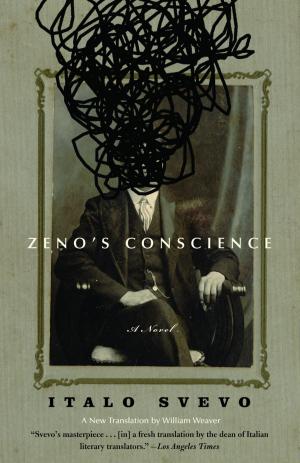Courts of Terror
Nonfiction, Reference & Language, Law, Emigration & Immigration, Social & Cultural Studies, Political Science, International, Foreign Legal Systems, Criminal law| Author: | Telford Taylor | ISBN: | 9780307819895 |
| Publisher: | Knopf Doubleday Publishing Group | Publication: | June 6, 2012 |
| Imprint: | Knopf | Language: | English |
| Author: | Telford Taylor |
| ISBN: | 9780307819895 |
| Publisher: | Knopf Doubleday Publishing Group |
| Publication: | June 6, 2012 |
| Imprint: | Knopf |
| Language: | English |
“The true quality of a judicial system is best measured by its resistance to stress, whether caused by community, racial, or other prejudice, or by the pressure of state political policies and interests.”
--Telford Taylor
Working in secret for the past several years, a group of distinguished American attorneys, including university law professors, has mounted an intensive campaign to secure the release of a score of Russians, most of them Jews attempting to emigrate to Israel, who have been incarcerated in Soviet prisons on a variety of trumped-up charges.
Telford Taylor, prosecutor at the Nuremberg war trials and now professor of law at Columbia University, is one of these lawyers. In this book he makes public how he and his colleagues—among them Alan Dershowitz, Leon Lipson, George Fletcher, and Melvin Stein—have challenged the Soviet judicial system on its own legal grounds, and how the Soviet Union has subverted its own rules for the conduct of trials and the confinement of prisoners in order to accommodate a government policy of discouraging emigration without appearing to prohibit it.
The author tells how he and his fellow attorneys prepared and presented to Russian officials petitions containing documentation of false indictments and twisted trial procedures. In one case, a factory mechanic, Isaac Shkolnik, accused of spying for the British, was brought to trial—when the British government denied the accusation—on charges of spying for Israel. In another, a carpenter, Pinkhas Pinkhasov, was tried and imprisoned for overpricing his services after his emigration permit had been issued. Taylor discloses how in case after case, trial after trial, charges have been fabricated, defendants have been denied counsel of their choice, and witnesses requested by the defense have been barred from testifying—all in clear defiance of Soviet law.
And—perhaps the most appalling of his revelations—he brings to light the shocking abuse of Jewish prisoners in the camps at the hands of ling-time inmates who were sentenced at the end of World War II for Nazi activities and who by virtue of seniority have become trusties with power to discipline the newcomers.
As of early 1976, despite the arduous labors of the American attorneys, despite their visits to Moscow to make personal appeals to Soviet officials (highlighted in Taylor’s account of his dramatic meeting with Roman Rudenko, now the Kremlin’s Procurator General, who served with him as a prosecutor at Nuremberg thirty years ago), only two of the prisoners had achieved early release in possibly unrelated actions. Courts of Terror documents with stinging force how a judicial system can be—and has been—perverted to serve the political purposes of totalitarian state. It is published to set forth the facts, and in hope of opening up new ways to action on behalf of the men who are still unjustly held prisoner.
“The true quality of a judicial system is best measured by its resistance to stress, whether caused by community, racial, or other prejudice, or by the pressure of state political policies and interests.”
--Telford Taylor
Working in secret for the past several years, a group of distinguished American attorneys, including university law professors, has mounted an intensive campaign to secure the release of a score of Russians, most of them Jews attempting to emigrate to Israel, who have been incarcerated in Soviet prisons on a variety of trumped-up charges.
Telford Taylor, prosecutor at the Nuremberg war trials and now professor of law at Columbia University, is one of these lawyers. In this book he makes public how he and his colleagues—among them Alan Dershowitz, Leon Lipson, George Fletcher, and Melvin Stein—have challenged the Soviet judicial system on its own legal grounds, and how the Soviet Union has subverted its own rules for the conduct of trials and the confinement of prisoners in order to accommodate a government policy of discouraging emigration without appearing to prohibit it.
The author tells how he and his fellow attorneys prepared and presented to Russian officials petitions containing documentation of false indictments and twisted trial procedures. In one case, a factory mechanic, Isaac Shkolnik, accused of spying for the British, was brought to trial—when the British government denied the accusation—on charges of spying for Israel. In another, a carpenter, Pinkhas Pinkhasov, was tried and imprisoned for overpricing his services after his emigration permit had been issued. Taylor discloses how in case after case, trial after trial, charges have been fabricated, defendants have been denied counsel of their choice, and witnesses requested by the defense have been barred from testifying—all in clear defiance of Soviet law.
And—perhaps the most appalling of his revelations—he brings to light the shocking abuse of Jewish prisoners in the camps at the hands of ling-time inmates who were sentenced at the end of World War II for Nazi activities and who by virtue of seniority have become trusties with power to discipline the newcomers.
As of early 1976, despite the arduous labors of the American attorneys, despite their visits to Moscow to make personal appeals to Soviet officials (highlighted in Taylor’s account of his dramatic meeting with Roman Rudenko, now the Kremlin’s Procurator General, who served with him as a prosecutor at Nuremberg thirty years ago), only two of the prisoners had achieved early release in possibly unrelated actions. Courts of Terror documents with stinging force how a judicial system can be—and has been—perverted to serve the political purposes of totalitarian state. It is published to set forth the facts, and in hope of opening up new ways to action on behalf of the men who are still unjustly held prisoner.















